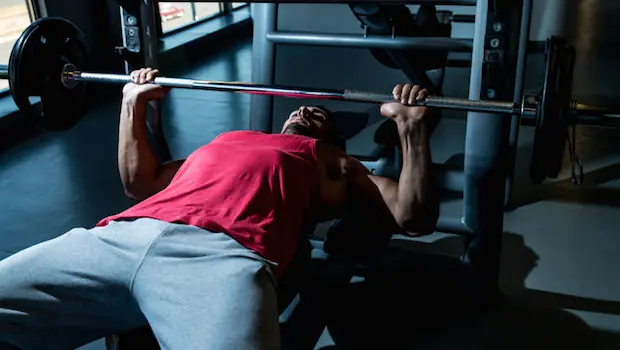
How much do you bench?
It's a common question heard in gyms, as the bench press is one of most popular exercises. With its popularity, however, comes a variety of mistakes, many of which occur in an effort to improve results.
Fitness Events Near You
If you're looking to improve your bench press, follow these guidelines:
Common Mistakes to Avoid When Doing the Bench Press
1. Locking your elbows: When completing the upward motion, do not lock your elbows because this can cause hyperextension of the elbow joint.
2. Moving your feet: When performing the bench press motion, keep the feet firmly planted on the ground to aid in support and stability.
3. Holding your breath: Neither breathing, nor having constant air exchange, can create intra-abdominal pressure which can lead to vomiting or passing out.
4. Lack of planning: It is important to go into this exercise knowing how many repetitions need to be completed and how much weight should be on the bar. Sometimes the weight is added incorrectly and can create an imbalance on one side.
5. Selecting a spotter: Do not just pick any person you see in the gym, but make sure you choose a person that can lift the weight in case the bar slips or something more serious happens.
How to Improve Your Bench Press
1. Save energy: When the bar is being pushed away from the chest, there is no need to give that extra shove that causes the shoulders to round forward and shoulder blades to lift off the bench. This wastes energy that is needed for another repetition.
2. Always count: Always count your repetitions underneath your breath. When you count, air is moving in and out of the lungs and air exchange will occur.
3. Two seconds up/down: Maintain a smooth rhythm by counting 2-seconds when pushing the weight up (concentric) and 2 seconds when bringing the weight down (eccentric). If there is a constant jerking motion of the weight, this can cause muscle strains, improper form, and potential injury to yourself and other individuals.
4. Leg strength: Increasing the strength and power in the legs will allow you to redirect that energy into a more powerful bench press. Make sure to not focus solely on the bench press, but to do a whole body workout.
5. Rest: This is probably the most important component. If the body cannot rest, then it cannot recover, grow, and get stronger. Remember, results are created outside of the gym when the body sleeps or is relaxing. When there is recovery, the body will respond in a positive manner.
The bench press is a great exercise, but it tends to be overused by a lot of individuals. Doing mainly upper body exercises may make you look good for aesthetic reasons, but it will not improve your performance in sports.
If you want performance, power and strength, you will need to work on your full body, including your legs, gluteus and upper body muscles. This will help you put up that heavy weight in the gym.
If you don't, your body will be imbalanced and you will look like a lollipop--a round, large strong upper body and a weak lower body that resembles sticks.
The rule of thumb is to exercise both the upper and lower body antagonist muscles (opposing exercises), in order to achieve balance in your body.
Related Articles:
- Which Is Better: The Push-Up or the Bench Press?
- The Best Upper-Body Exercise for Men
- Upper-Body Warm-Up Exercises
Connect with us on Twitter, Facebook, Instagram or Pinterest for more tips, recipes and ideas to fuel your ACTIVE life.
 Stay in shape in a fitness class or read more fitness articles.
Stay in shape in a fitness class or read more fitness articles.



